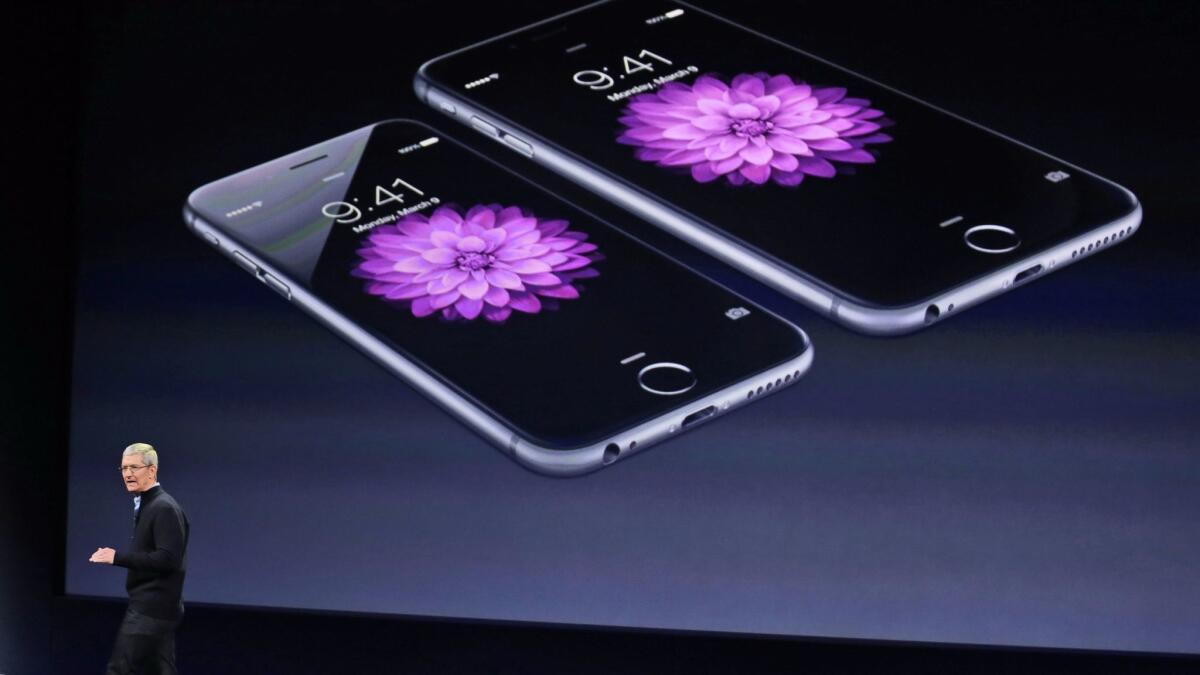Apple faces class-action lawsuits over slowed-down iPhones

- Share via
IPhone owners from several states have filed at least nine class-action lawsuits against Apple Inc. for not disclosing sooner that its software updates deliberately slowed down older-model phones so batteries would last longer.
The lawsuits — filed in U.S. district courts in California, New York and Illinois — allege that Apple’s silence led the iPhone owners to wrongly conclude that they had to buy newer, pricier iPhones instead of simply replacing the battery.
Three of the lawsuits were filed by Los Angeles-area residents. One accuses Apple of fraud through concealment and unfair business practices. Another accuses Apple of breaching an implied contract — that is, it argues that when people buy iPhones, they do so with the assumption that Apple won’t “purposefully interfere with” the phones’ “usage or value.” The lawsuit says Apple did not get iPhone owners’ consent before meddling with the phones’ speed. The third alleges a slew of misdeeds, including fraud, false advertising and unjust enrichment.
And in Israel, iPhone owners filed a class-action suit against Apple on Monday, accusing the company of a breach of duty toward customers by failing to disclose that software updates would slow the performance of older phones, local news outlets reported.
The lawsuits came after Apple confirmed last week what high-tech sleuths outside the company had already observed: The company deployed software to slow some phones. Apple said the software was intended as a fix to deal with degraded lithium-ion batteries that could otherwise suddenly die.
“Our goal is to deliver the best experience for customers, which includes overall performance and prolonging the life of their devices,” Apple said in a statement. The Cupertino, Calif., company said it released the fix for iPhone 6, iPhone 6s and iPhone SE and later extended it to iPhone 7.
Apple did not respond to a message Wednesday seeking additional comment.
The Illinois lawsuit suggests Apple’s motive may have been sinister, though it offers no evidence in the filing.
“Apple’s decision to purposefully ... throttle down these devices,” it says, “was undertaken to fraudulently induce consumers to purchase the latest” iPhone.
Kirk Pedelty, a North Carolina resident who is a plaintiff in the Illinois lawsuit, contacted Apple as his frustration grew. However, the lawsuit says: “Nobody from Apple customer support suggested that he replace his battery to improve the performance of his iPhone. ... Frustrated by slowdowns and intermittent shutdowns of his iPhone 7, Pedelty purchased an iPhone 8.”
James Vlahakis, an attorney representing the plaintiffs in the Illinois lawsuit, said he has been contacted by more iPhone users who say they suffered the same problem and is considering amending the lawsuit to include a request for Apple to provide battery replacements or offer refunds to consumers who bought devices unnecessarily.
“A lot of people are upset, because phones aren’t cheap,” Vlahakis said. He said he thinks Apple should have disclosed that a software update could affect the phone’s performance so consumers would have known replacing the battery was a possible solution.
“We think they could have extended the phones’ life if [Apple] had been more honest,” he said.
Attorneys representing Los Angeles residents Stefan Bogdanovich and Dakota Speas said Apple, as a global tech giant, should have been savvy enough to alert customers about their phones’ diminished performance.
“We bought Apple’s smartphones in part because they were able to run applications quickly,” Bogdanovich and Speas said in a joint statement. “That is part of what we bargained for. When Apple admitted to this secret practice, it was clear we needed to take legal action.”
Karl Manheim, a professor of law at Loyola Law School, said the lawsuits could have merit under state consumer protection or unfair business practice laws.
“This could be like the modern version of planned obsolescence,” Manheim said.
News of the throttling has led to surging interest in battery replacements, said Kyle Wiens, co-founder and chief executive of iFixit, a seller of repair parts and publisher of repair guides. Three times as many customers have inquired about iPhone 7 battery replacements, he said.
“We’ve been flat out busy since Apple’s admission,” Wiens said. “Replacing batteries in phones is like replacing tires. The difference is car manufacturers say you should be replacing your tires.”
The Associated Press was used in compiling this report. Chicago Tribune staff writer Lauren Zumbach contributed to this report.
Twitter: @traceylien
UPDATES:
3:45 p.m.: This article was updated to include comment from Karl Manheim, a professor of law at Loyola Law School, and Kyle Wiens, co-founder and chief executive of iFixit.
1:50 p.m.: This article was updated with a statement from plaintiffs Stefan Bogdanovich and Dakota Speas.
This article was originally published at 11 a.m.







